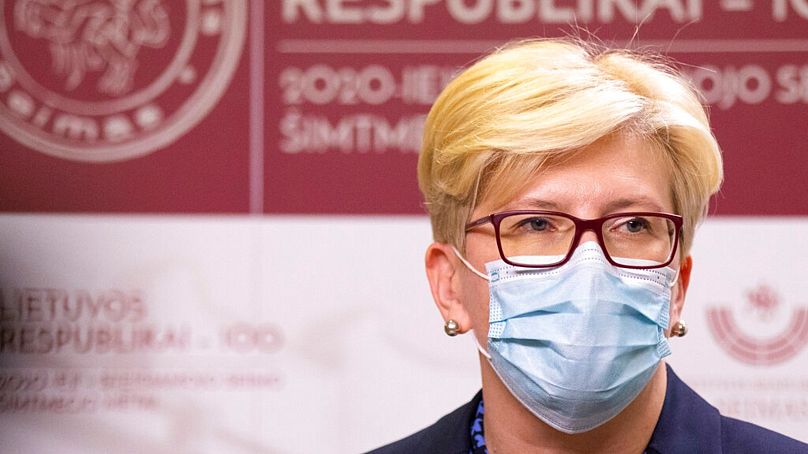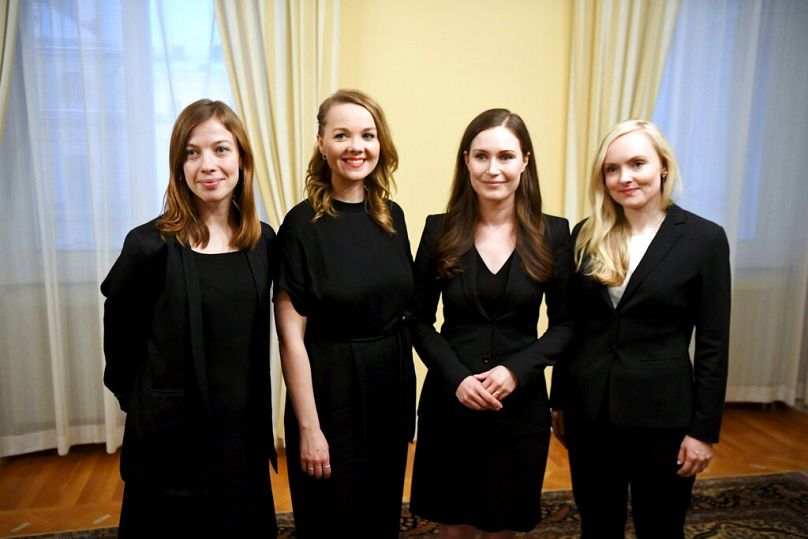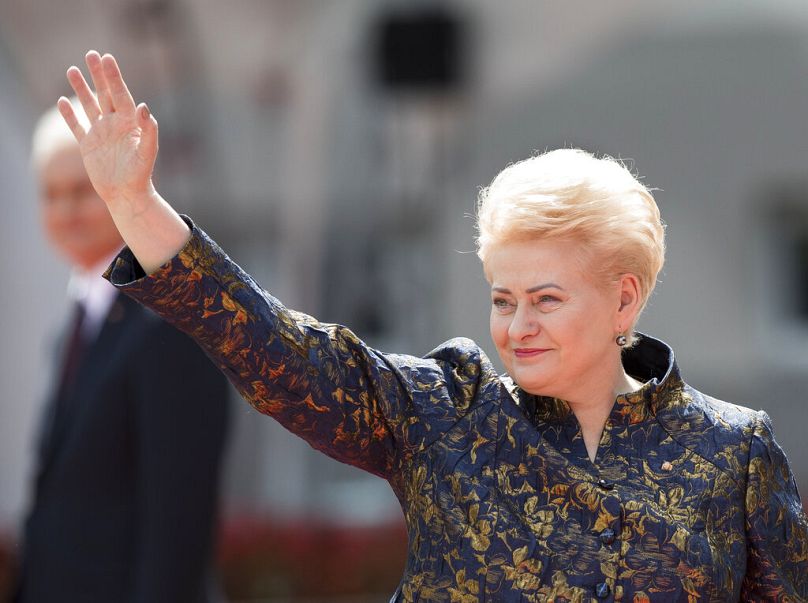The emergence of a female-led governing coalition has sent shockwaves across swathes of Lithuanian society.
Lithuania is often so masculine in its outlook that independent, straight-talking females are still referred to as "women with balls".
 ADVERTISEMENT
ADVERTISEMENT
 ADVERTISEMENT
ADVERTISEMENT
So the emergence of a female-led governing coalition has sent shockwaves across swathes of Lithuanian society.
Ingrida Simonyte is not the country's first female prime minister. But she is one of three women - representing each of the coalition parties - pulling the strings of government. That in itself is highly unusual.
On top of that, another potential first: half of Lithuania's 14-strong cabinet - if approved by the president - will be women.
It's a development that does not tally with the statistics. Lithuania ranks 22 out of 28 countries on the EU Gender Equality Index. Its score of 56.3 points out of 100, is well below the EU average and it has dropped four places since 2010.
Who are the women leading Lithuania?
Ingrida Simonyte, who was this week confirmed as Lithuania's new prime minister, represents the conservative Homeland Union-Lithuanian Christian Democrats (HU-LCD) party.
A former finance minister and presidential candidate, HU-LCD won the most votes in October's parliamentary election.
The 46-year-old trained economist is widely known for her fondness for ice hockey, football and rock music.
Viktorija Cmilyte-Nielsen heads up the Liberal Movement, which won just 7% of the vote in October and is one of three parties in the governing coalition.
The 37-year-old is also a European chess champion and is credited with saving the movement from extinction.
She will head up Lithuania's parliament, the Seimas.
Ausrine Armonaite, 31, is a former member of the Liberal Movement but left to form the new Freedom Party in 2019.
The party, which includes the mayor of Vilnius among its ranks, won more than 9% of the vote in October's election.
She has been put forward to be Lithuania's next economy minister.
Meanwhile, there are several other women put forward for cabinet posts: Gintare Skaiste (education);Jurgita Siugzdinienė (science/sport); Monika Navickiene (social security/labour); Agne Bilotaite (interior ministry); Dalia Miniataite (agriculture); and Evelina Dobrovolska (justice).
What has the reaction been like?
“Frankly, I have never heard of some of the names," said Vytautas Dumbliauskas, associate professor of Mykolas Romeris University in Vilnius, referring to the proposed cabinet. "Lithuania has never had a coalition or a government like that.”
Dumbliauskas's sentiments were echoed by Lithuania's outgoing prime minister Saulius Skvernelis.
“I believe my colleague Ingrida is really brave, very, very, very, very, brave,” he said. “She is an experienced captain, but with such a crew as hers I would not sail across the ocean even as a passenger.”
Indeed female members of her "crew" have already been subject to scrutiny that perhaps male ones would not ordinarily receive.
For example, tattoos on the upper chest of Dobrovolska (proposed for the justice ministry) stirred a debate on social media, compelling her to explain. “If I were a man - not a woman and a Pole by nationality - I’d not fall under such scrutiny,” Dobrovolska told LRT.
Is Lithuania the new Scandinavia?
This is a question some will pose given Lithuania's proximity to the likes of Sweden, Finland and Denmark, frequently lauded for progress in terms of gender equality. Indeed the government in Helsinki is led by a coalition of five female party leaders.
Experts, however, are adamant Lithuania still has a long way to go.
“To me, the high number of women in the new government is more of a coincidence, the result of the swinging of the political pendulum rather than the aftermath of a societal and cultural shift, one Scandinavia has seen,” Aiste Ramonaite, professor at the Institute of International Relations and Political Science of Vilnius University, told Euronews.
Vytautas Bruveris, an analyst at daily newspaper Lietuvos Rytas, agrees.
“Definitely not a trend or a cultural shift," Bruveris told Euronews. "Lithuania has not yet seen a major breakthrough on gender quality – and neither [has] the political parties.
"Frankly, to me, the jubilant emphasis on women’s prevalence in the coalition and the government is sexist in its core. Underneath it lies quite a deplorable situation of women in Lithuania, where women are still being considerably underpaid and misrepresented in various power structures.”
Nevertheless, Tomas Janeliunas, professor at the Institute of International Relations and Political Science of Vilnius University said with only one female minister in the previous government, having such a potential increase would be “remarkable”.
“But is Lithuania going through a cultural and societal shift in terms of egalitarianism? No, I do not think so. It seems to me a happenchance. Lithuania is still pretty far from the Scandinavian standards in terms of gender equality,” the analyst concluded.
How might this government change Lithuania?
The new cabinet's plate is full already. The biggest headache seems to be the volatile spread of COVID-19 — exceeding two thousand daily cases on most days recently — and the impact on the economy.
Simonyte has expressed concerns about the shallow state coffers, even though the International Monetary Fund (IMF) predicted the Lithuanian economy will contract a mere 1.8% — the smallest drop in Europe — and GDP growth of 4.1% next year.
There could also be coalition tension of a liberal push to lower taxes and legalise same-sex partnerships.
“The first impression I am receiving about the new coalition is not much different from those I’ve had with the other new coalitions in the past: plenty of promises, but what sets this one apart from the others in the past, is abstractness and the declarative nature of its programme," said Bruveris.
"Disagreements in the coalition can be 'programmed' prior to the start and they stem from the different perception of values, be it legislating same-sex partnerships or decriminalising small possession of marijuana, ratifying the Istanbul Convention, or allowing to write non-Lithuanian names with the diacritics of the original language, all of which the Freedom Party wants, for example.”
It is obviously too early to judge the coalition, but experts agree that the female-driven coalition has an unprecedented opportunity.
“The women are in a unique position to shatter the conviction of many here that males are better managers in general," said Dumbliauskas.
"The years of the previous, nearly-all-male-governments were marked with never-ending-squabbles and, with women in the coalition and the government, we may see change and be approaching Scandinavia (in terms of gender quality).
"But only the future will show if a cabinet like this will be a one-time thing or something that will develop into something deeper and better.”
“The three women have been given a unique possibility to shake-up the Conservative sexism-ridden patriarchal Lithuanian society, but, like many other Eastern European states, Lithuania is still far from the front of gender equality," said Bruveris. "If the new Coalition does well, then the cause will be enhanced, but if they fail or sink into squabbles, the army of naysayers will be handed a formidable argument: 'Look, what happens when women are given power!'
PM Simonyte, perhaps mindful of the deep-rooted perceptions, said the women-led coalition did not have a goal of destroying "the old-world order”.
“However, the goal is to change those solutions that don't work. But this does not mean that we have to change everything today,” she told the national broadcaster, LRT.
Asked why women were considered the victors of October's election, she added: “I think what led to this was that there's a little less testosterone in a discussion led by a woman, more listening and more willingness to recognise one's own limitations."
Every weekday at 1900 CET, Uncovering Europe brings you a European story that goes beyond the headlines. Download the Euronews app to get an alert for this and other breaking news. It's available on Apple and Android devices.













